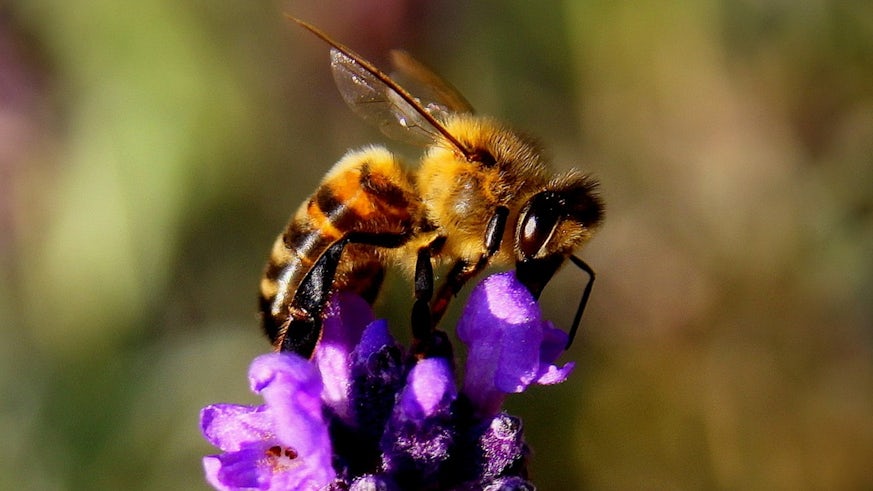Cardiff success at Guardian University Awards
31 March 2017

A bee-friendly campus initiative, run by the School of Pharmacy and Pharmaceutical Sciences, has won the Sustainability category at the Guardian University Awards 2017.
The award was presented this week (29 March) at a London ceremony showcasing pioneering work at UK universities to transform the lives of students and communities.
The Pharmabees project, which has led to the University being recognised by the Welsh Assembly as a bee-friendly organisation combines a commitment to sustainability with the aim of tackling the problem of antimicrobial resistance. Bees are essential to the planet’s survival but their numbers are declining significantly. Cardiff’s campus encourages the growth of the local bee population and, by planting certain wildflowers whose nectar is present in antimicrobial honey, is helping the search for new drugs to treat hospital infections caused by superbugs.
Having identified the plants favoured by bees producing antimicrobial honey, the Pharmabees team has started to naturally reproduce the honey on campus, as well as encouraging local schools and communities to have their own bee hives.
The team began by installing beehives on the roof of the Redwood Building, training members of staff as beekeepers, and planting the ground around the building with antibacterial and bee-friendly plants. Following this initial success, beehives have been installed on the roofs of a number of other campus buildings and the team has been working with colleagues across the University to create a beekeeper community.
Professor Les Baillie, School of Pharmacy and Pharmaceutical Sciences, said: “The decline in bee numbers has been precipitated in part by loss of habitat and if we can be more strategic about what plants we have on campus we can play our part in helping these creatures that are fundamental to our survival.
“The project has certainly captured the imagination of our staff, students, and volunteers across the city and, indeed, much of our success is thanks to the dedication and hard work of our volunteer gardeners and beekeepers! We also owe thanks to our Estates colleagues who have really helped us to move the project forward and will be key to its continued success.”
Being a bee-friendly University is just one step. The team is also turning Cardiff into a bee-friendly city and structuring the project as a model that could be shared with other regions as well. Going out into the city, the team has been working with external partners to turn gardens, parks and unused urban sites into rich habitats.
https://www.youtube.com/watch?v=tQctVn4QQQU&feature=youtu.be&a
Success in winning funding from a range of sources has allowed the University to partner with organisations across south Wales to enrich the biodiversity of green spaces. This has included £14,000 from the Welsh government to support Tetto Verde, a project creating green spaces in urban areas; £9,500 from the Wellcome Trust to support local schools in integrating bees and biodiversity into their teaching; £20,000 to develop a bee-friendly green roof covering to enrich the urban environment; £12,000 to work with historian colleagues to explore ancient honey-based wound dressing as a source of modern drugs; and £5,000 from Santander to support Spot a Bee, a citizen science project creating a map of Cardiff showing which plants have been visited by local bees and where they are located.
The project has also been successful in helping to interest children in science and the natural world. To date, Pharmabees has linked with eight schools across the region, providing them with bee hives, training and educational tools linked to the national curriculum.

